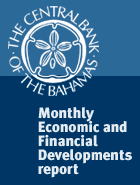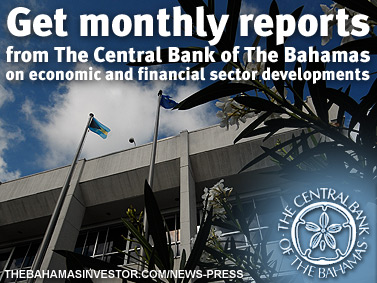| Source: Date: Updated: |
Central Bank of The Bahamas
Friday, September 13, 2013 Friday, September 13, 2013 |
Domestic economic conditions remained challenging during the review month, reflecting continued weakness in the major tourism sector, which offset steady gains in capital formation provided by various foreign investment-led construction activities. However, with the spill-over effects remaining narrowly based, the impact on employment conditions was minimal. Price developments exhibited a slowing in inflation over the twelve-months to July, reflecting the pass-through effects of lower global oil prices. On the fiscal side, mildness in economic activity and the normalization of collections contributed to a downturn in tax revenues which, together with a rise in current spending, fostered a widening in the fiscal deficit during the eleven months of FY2012/13. In the monetary sector, both liquidity and external reserves trended moderately lower in July, amid some gains in private sector credit, with credit quality indicators registering mild improvement.
Preliminary tourism sector data for the first half of 2013 showed persistent softness in the high value-added stopover segment of the market, due to reported declines in group business, increased competition from low-cost regional destinations, and some reduction in airlift capacity. Growth in visitors slackened sharply to 1.4%, to number 3.2 million, from 9.6% in the prior year. The air segment declined by 6.2%, a strong reversal from the 10.2% improvement achieved in 2012, and the expansion in sea passengers slowed markedly to 3.7% from last year’s 9.4%. Disaggregated by first port of entry, tourist arrivals to New Providence rose by 8.5% to 1.9 million, occasioned by a 15.9% advance in the sea segment, which outweighed the 6.4% reduction in air arrivals. In contrast, the Grand Bahama market weakened by 4.8%, reflecting contractions in both air and sea passengers, by 19.0% and 2.4%, respectively. Similarly, the number of visitors to the Family Islands decreased by 7.8%, as a 9.1% falloff in sea traffic overshadowed the 1.7% rise in the air component.
The contraction in stopover arrivals adversely affected hotel earnings, as preliminary data from a sample of fourteen (14) major hotels in New Providence and Paradise Island reported a 6.6% decline in total room revenue over the January to July period, in comparison to the previous year. This development was due solely to a reduction in the average occupancy rate, by 5.0 percentage points to 69.6%, which outstripped the 3.2% increase in the average daily room rate (ADR) to $251.20.
Domestic consumer price inflation for the twelve months to July—as measured by changes in the Retail Price Index for The Bahamas—narrowed by 2.4 percentage points to 0.83%, with accretions to average transportation costs decelerating by 5.8 percentage points to 0.35%. Lower average prices gains were also posted for furnishing, household equipment & maintenance, to 1.3% from 4.2%; housing, water, gas, electricity & other fuels—the most heavily weighted component in the index—to 1.3% from 3.7%, while both food & non-alcoholic beverages and education average cost increases slowed by an identical 1.7 percentage points to 1.5%. Most of the remaining components registered reduced price appreciations of under 1.0 percentage point, with the exception of communication and recreation & culture costs, which declined by 4.5% and 0.5%, vis-a-vis year-earlier respective gains of 0.2% and 0.5%.
Domestic fuel costs trended downwards in July, as the average prices of gasoline and diesel fell by 1.5% and 3.8%, on a monthly basis, to $5.31 and $4.86 per gallon; however, year-on-year, the average costs still trended higher, by 0.8% and 1.0%, respectively. Similarly, the Bahamas Electricity Corporation’s fuel charge decreased by 3.8%, month-on-month, to 27.32¢ per kilowatt hour (kWh), and by 4.2% on an annual basis.
Initial data on the Government’s budgetary operations for the eleven months of FY2012/13 revealed a deterioration in the overall deficit, by $146.6 million (49.3%) to $444.0 million, amid a contraction in total revenue, by $78.8 million (5.9%) to $1,250.3 million, and an increase in aggregate expenditure, by $67.8 million (4.2%) to $1,694.3 million. In terms of receipts, tax collections decreased by $59.8 million (5.1%) to $1,120.9 million, owing primarily to a $99.1 million (15.1%) reduction in taxes on international trade, as excise taxes returned to trend levels after arrears payments provided a significant one-off boost last year. In addition, non-tax collections were lower by $1.3 million (1.0%) at $129.3 million, as a 15.5% falloff in income proceeds outstripped the 7.0% rise in fines, forfeits & administrative fees. Spending developments included an increase in current outlays by $59.8 million (4.5%) to $1,393.6 million, reflecting a $38.8 million (7.6%) advance in transfer payments and a $19.3 million (3.7%) gain in wages & salaries. Capital spending also firmed, by $15.0 million (7.7%) to $210.7 million, buoyed by budgetary support to non-financial public enterprises ($12.1 million) and other infrastructure outlays ($11.3 million); however, net lending fell by $7.0 million.
For full text reading, please download the attached document here.












